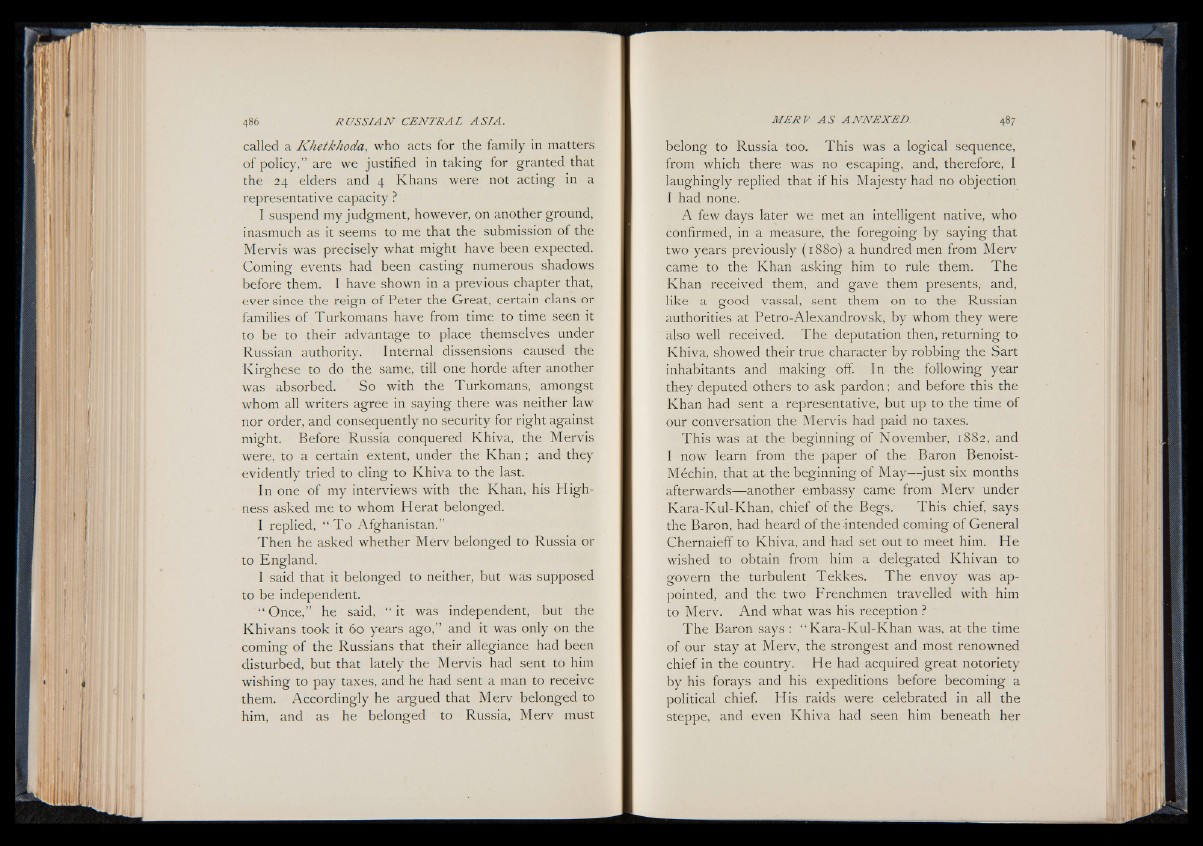
called a Khetkhoda, who acts for the family in matters
of policy,” are we justified in taking for granted that
the 24 elders and 4 Khans were not acting in a
representative capacity ?
I suspend my judgment, however, on another ground,
inasmuch as it seems to me that the submission of the
Mervis was precisely what might have been expected.
Coming events had been casting numerous shadows
before them. I have shown in a previous chapter that,
ever since the reign of Peter the Great, certain clans or
families of Turkomans have from time to time seen it
to be to their advantage to place themselves under
Russian authority. Internal dissensions caused the
Kirghese to do the same, till one horde after another
was absorbed. So with the Turkomans, amongst
whom all writers agree in saying there was neither law
nor order, and consequently no security for right against
might. Before Russia conquered Khiva, the Mervis
were, to a certain extent, under the Khan ; and they
evidently tried to cling to Khiva to the last.
In one of my interviews with the Khan, his Highness
asked me to whom Herat belonged.
I replied, “ T o Afghanistan.”
Then he asked whether Merv belonged to Russia or
to England.
I said that it belonged to neither, but was supposed
to be independent.
“ Once,” he said, “ it was independent, but the
Khivans took it 60 years ago,” and it was only on the
coming of the Russians that their allegiance had been
disturbed, but that lately the Mervis had sent to him
wishing to pay taxes, and he had sent a man to receive
them. Accordingly he argued that Merv belonged to
him, and as he belonged to Russia, Merv must
belong to Russia too. This was a logical sequence,
from which there was no escaping, and, therefore, I
laughingly replied that if his Majesty had no objection
I had none.
A few days later we met an intelligent native, who
confirmed, in a measure, the foregoing by saying that
two years previously (1880) a hundred men from Merv
came to the Khan asking him to rule them. The
Khan received them, and gave them presents, and,
like a good vassal, sent them on to the Russian
authorities at Petro-Alexandrovsk, by whom they were
also well received. The deputation then, returning to
Khiva, showed their true character by robbing the Sart
inhabitants and making off. In the following year
they deputed others to ask pardon; and before this the
Khan had sent a representative, but up to the time of
our conversation the Mervis had paid no taxes.
This was at the beginning of November, 1882, and
I now learn from the paper of the Baron Benoist-
Mechin, that at the beginning of May— just six months
afterwardsH-another embassy came from Merv under
Kara-Kul-Khan, chief of the Begs. This chief, says
the Baron, had heard of the intended coming of General
Chernaieff to Khiva, and had set out to meet him. He
wished to obtain from him a delegated Khivan to
govern the turbulent Tekkes. T he envoy was appointed,
and the two Frenchmen travelled with him
to Merv. And what was his reception ?
The Baron says : “ K ara-Kul-Khan was, at the time
of our stay at Merv, the strongest and most renowned
chief in the country. He had acquired great notoriety
by his forays and his expeditions before becoming a
political chief. His raids were celebrated in all the
steppe, and even Khiva had seen him beneath her